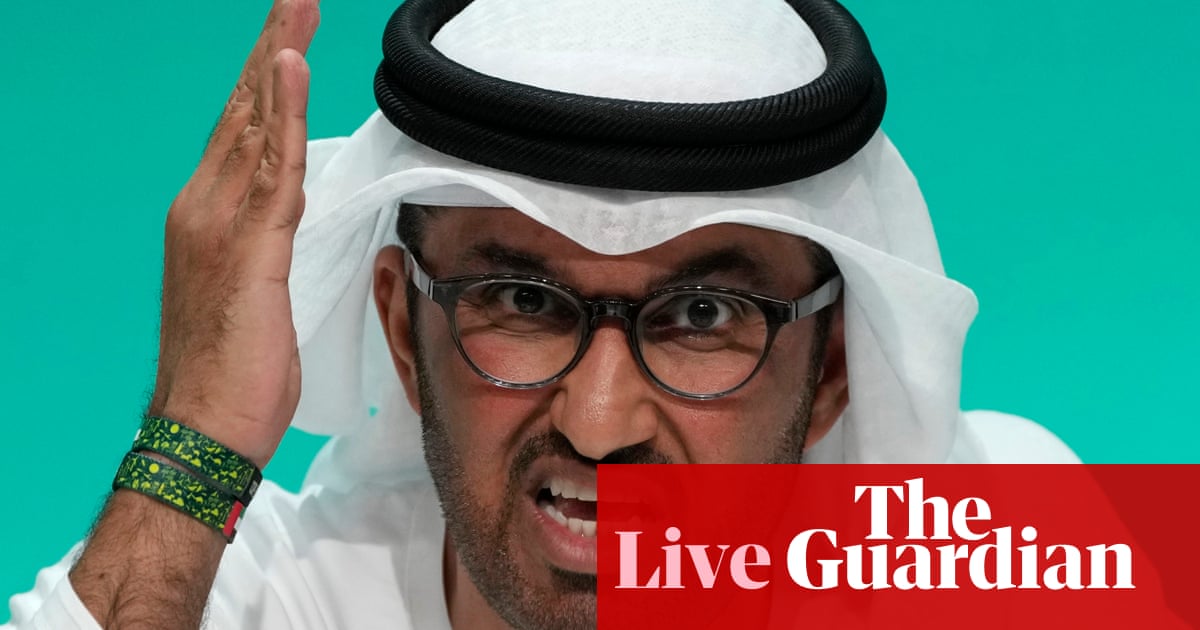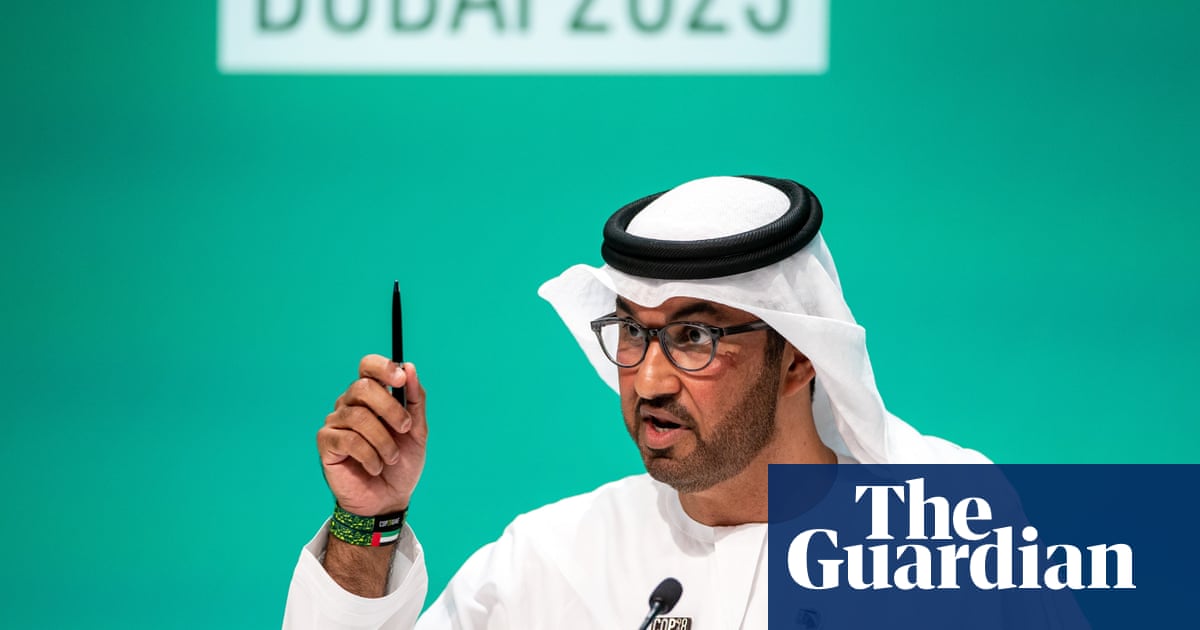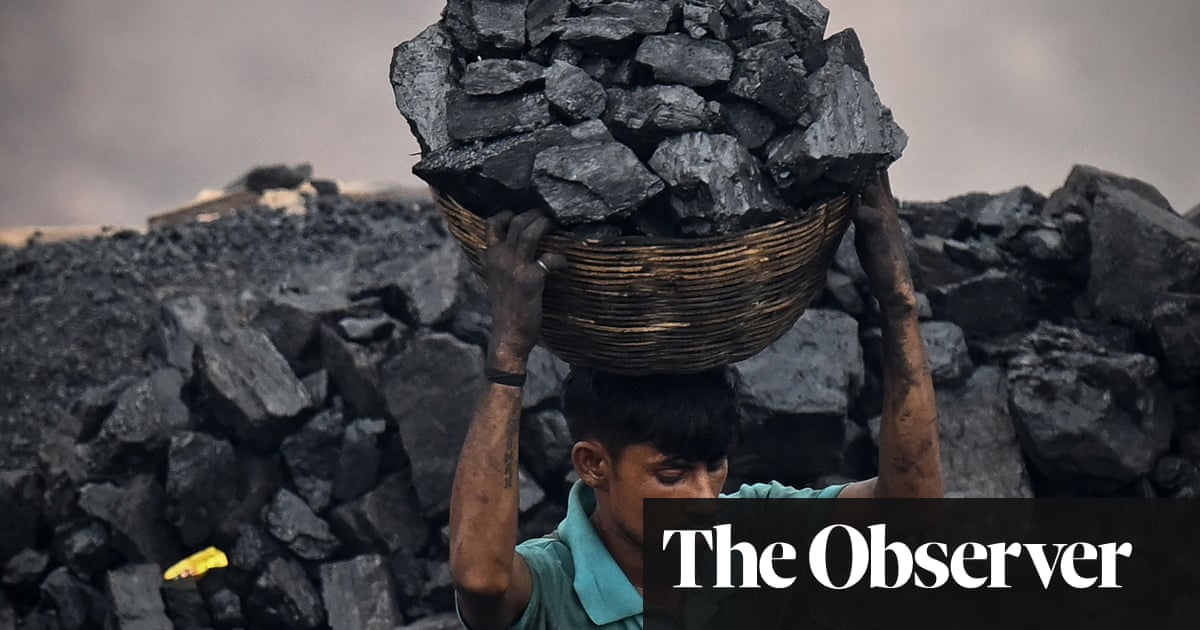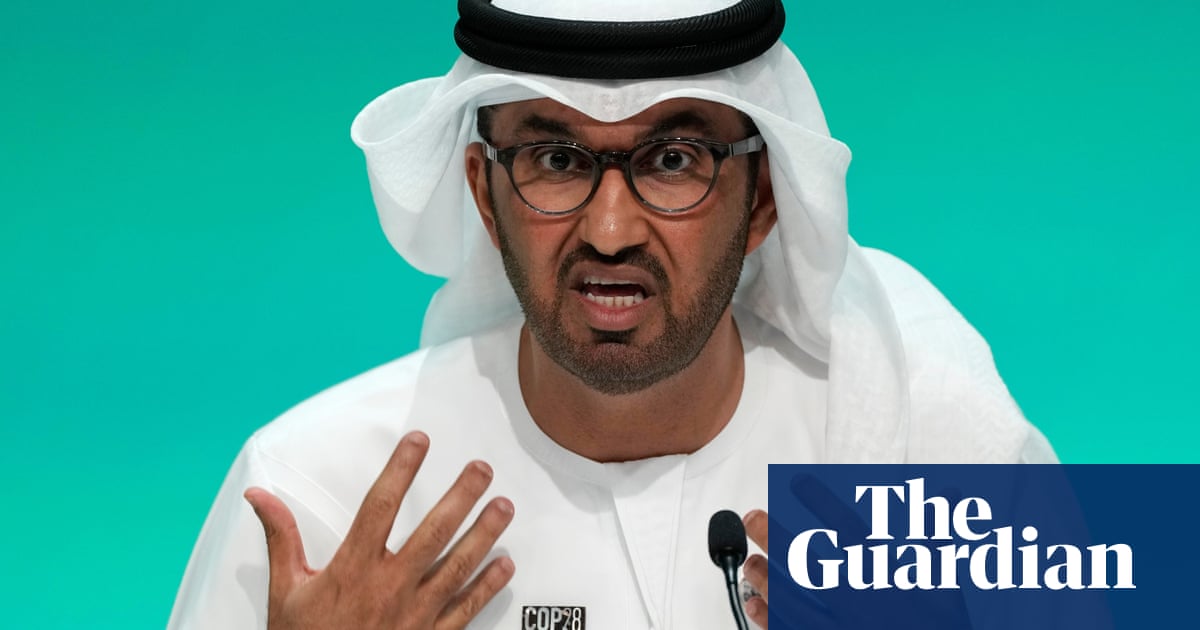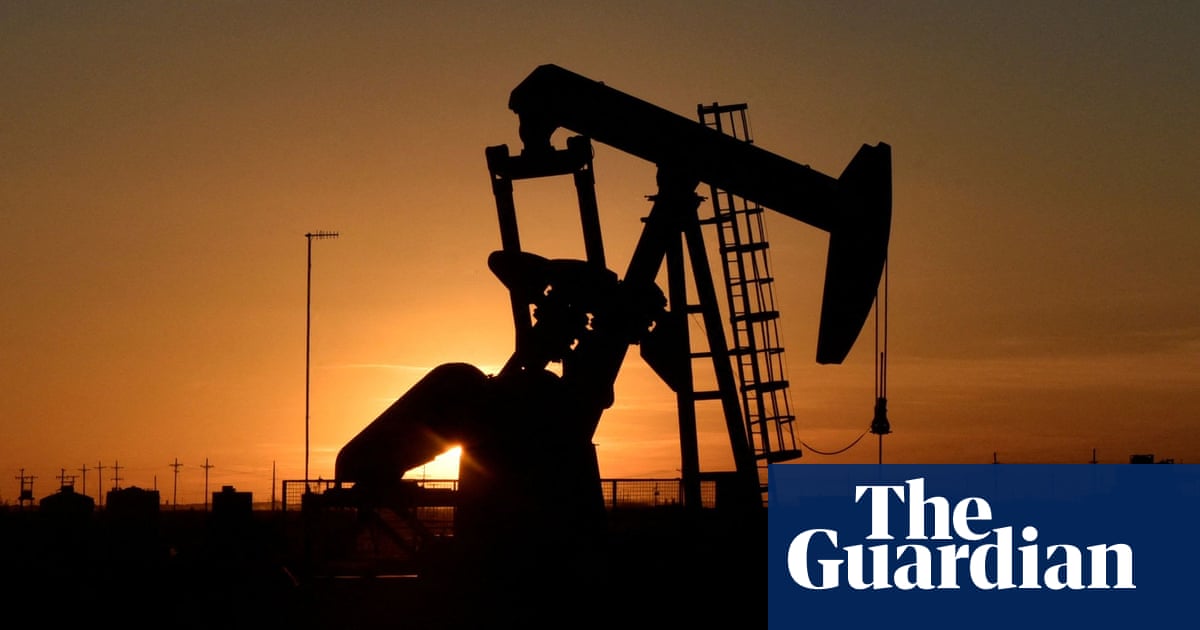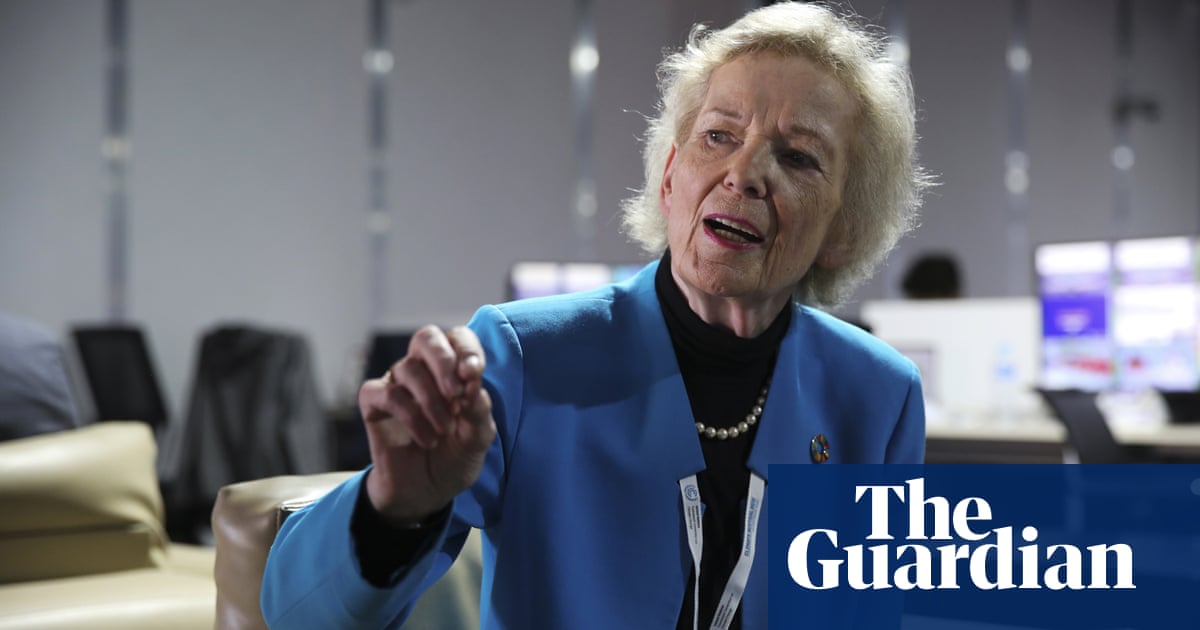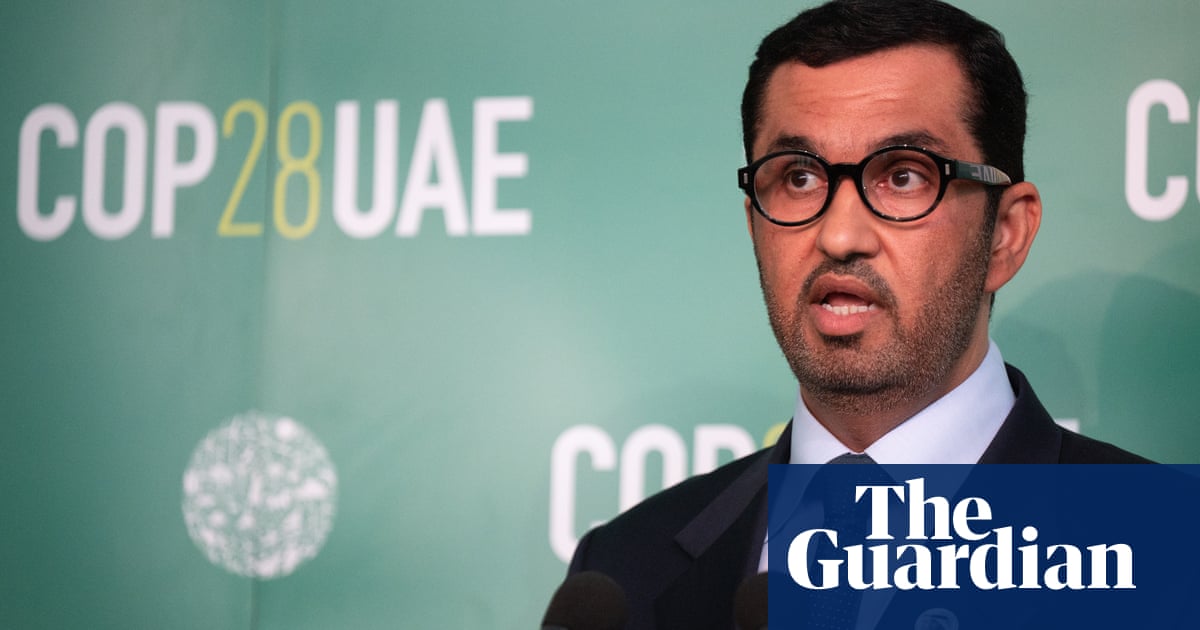
The president of Cop28, Sultan Al Jaber, has claimed there is “no science” indicating that a phase-out of fossil fuels is needed to restrict global heating to 1.5C, the Guardian and the Centre for Climate Reporting can reveal.
Al Jaber also said a phase-out of fossil fuels would not allow sustainable development “unless you want to take the world back into caves”.
The comments were “incredibly concerning” and “verging on climate denial”, scientists said, and they were at odds with the position of the UN secretary general, António Guterres.
Al Jaber made the comments in ill-tempered responses to questions from Mary Robinson, the chair of the Elders group and a former UN special envoy for climate change, during a live online event on 21 November. As well as running Cop28 in Dubai, Al Jaber is also the chief executive of the United Arab Emirates’ state oil company, Adnoc, which many observers see as a serious conflict of interest.
More than 100 countries already support a phase-out of fossil fuels and whether the final Cop28 agreement calls for this or uses weaker language such as “phase-down” is one of the most fiercely fought issues at the summit and may be the key determinant of its success. Deep and rapid cuts are needed to bring fossil fuel emissions to zero and limit fast-worsening climate impacts.
Al Jaber spoke with Robinson at a She Changes Climate event. Robinson said: “We’re in an absolute crisis that is hurting women and children more than anyone … and it’s because we have not yet committed to phasing out fossil fuel. That is the one decision that Cop28 can take and in many ways, because you’re head of Adnoc, you could actually take it with more credibility.”
Al Jaber said: “I accepted to come to this meeting to have a sober and mature conversation. I’m not in any way signing up to any discussion that is alarmist. There is no science out there, or no scenario out there, that says that the phase-out of fossil fuel is what’s going to achieve 1.5C.”
Robinson challenged him further, saying: “I read that your company is investing in a lot more fossil fuel in the future.” Al Jaber responded: “You’re reading your own media, which is biased and wrong. I am telling you I am the man in charge.”
Al Jaber then said: “Please help me, show me the roadmap for a phase-out of fossil fuel that will allow for sustainable socioeconomic development, unless you want to take the world back into caves.”
“I don’t think [you] will be able to help solve the climate problem by pointing fingers or contributing to the polarisation and the divide that is already happening in the world. Show me the solutions. Stop the pointing of fingers. Stop it,” Al Jaber said.
Guterres told Cop28 delegates on Friday: “The science is clear: The 1.5C limit is only possible if we ultimately stop burning all fossil fuels. Not reduce, not abate. Phase out, with a clear timeframe.”
Bill Hare, the chief executive of Climate Analytics, said: “This is an extraordinary, revealing, worrying and belligerent exchange. ‘Sending us back to caves’ is the oldest of fossil fuel industry tropes: it’s verging on climate denial.”
“Al Jaber is asking for a 1.5C roadmap – anyone who cares can find that in the International Energy Agency’s latest net zero emissions scenario, which says there cannot be any new fossil fuel development. The science is absolutely clear [and] that absolutely means a phase-out by mid-century, which will enhance the lives of all of humanity.”
Prof Sir David King, the chair of the Climate Crisis Advisory Group and a former UK chief scientific adviser, said: “It is incredibly concerning and surprising to hear the Cop28 president defend the use of fossil fuels. It is undeniable that to limit global warming to 1.5C we must all rapidly reduce carbon emissions and phase-out the use of fossil fuels by 2035 at the latest. The alternative is an unmanageable future for humanity.”
Dr Friederike Otto, of Imperial College London, UK, said: “The science of climate change has been clear for decades: we need to stop burning fossil fuels. A failure to phase out fossil fuels at Cop28 will put several millions more vulnerable people in the firing line of climate change. This would be a terrible legacy for Cop28.”
Otto also rejected the claim that fossil fuels were necessary for development in poorer countries, saying that the latest report from the Intergovernmental Panel on Climate Change “shows that the UN’s sustainable development goals are not achievable by continuing the current fossil-driven high emission economies. [There are] massive co-benefits that come with changing to a fossil-free world”.
A spokesperson for Cop28 said: “The IEA and IPCC 1.5C scenarios clearly state that fossil fuels will have to play a role in the future energy system, albeit a smaller one. The Cop president was quoting the science, and leading climate experts.
“He has clearly said that the oil and gas industry must tackle scope 1 and 2 emissions [from their operations], must invest in clean energy and clean technologies to address scope 3 emissions [from burning fuels], and that all industry must align around keeping the north star of 1.5C within reach.
“Once again, this is clearly part of a continued effort to undermine the Cop presidency’s tangible achievements and a misrepresentation of our position and successes to date.”
The spokesperson said the presidency had operationalised the loss and damage fund with more than $700m, launched a $30bn private market climate vehicle, and brought 51 oil companies to agree decarbonisation targets and 119 countries to sign a pledge to triple renewable energy. “This is just the beginning,” the spokesperson said.
Al Jaber is also head of Masdar, the UAE’s renewable energy company, but his appointment as Cop28 president has been controversial. Shortly before the summit, leaked documents showed that the UAE had planned to use climate meetings with governments to promote oil and gas deals. Al Jaber denied having seen or used the talking points in the documents. Adnoc also has the largest net-zero-busting expansion plans for oil and gas, according to independent analysis.
The issue of a phase-out or phase-down is complicated by the terms not having agreed definitions and by the highly uncertain role of technologies to “abate” emissions, such as carbon capture and storage. “Keeping the Paris agreement targets alive will require a full fossil fuel phase-out, not a vague phase-down relying on unproven technologies,” said Otto.
More than 100 African, European, Pacific and Caribbean countries back a phase-out of unabated fossil fuels. The US, the world’s biggest oil and gas producer, also backs a phase-out. Others, such as Russia, Saudi Arabia and China, reject the call. Both options are on the table at Cop28, as well as proposals to only mention coal, or to not say anything at all about fossil fuels.
Cop26 in Glasgow in 2021 agreed for the first time to “phase down” coal use, but this had been watered down from “phase out” at the last minute, bringing the Cop26 president, Alok Sharma, to tears.
In his conversation with Robinson, Al Jaber also said: “A phase-down and a phase-out of fossil fuel in my view is inevitable. That is essential. But we need to be real serious and pragmatic about it.”
“Hold on. Let me just explain,” he said. “The world will continue to need energy sources. We [UAE] are the only ones in the world today that have been decarbonising the oil and gas resources. We have the lowest carbon intensity.”
This refers to the emissions from the energy used to extract fossil fuels, not the far larger emissions from burning the fuels. “There is no such thing as ‘low carbon’ or ‘lower carbon’ oil and gas,” said Otto.
Numerous commentators have said that negative or embarrassing revelations about Al Jaber and Adnoc increase the pressure on him to deliver a strong Cop28 deal. The Guardian reported recently that state-run UAE oil and gas fields had been flaring gas almost daily despite having committed 20 years ago to a policy of zero routine flaring.
The Guardian previously reported that Adnoc had been able to read emails to and from the Cop28 office until the Guardian raised the issue in June and that the UAE had also failed to report its oil industry’s emissions of the powerful greenhouse gas methane.
Harjeet Singh, at Climate Action Network, said: “Cop28 must deliver a decision on phasing out fossil fuels in a just and equitable manner, without any loopholes or escape routes for the industry to continue expanding and exacerbating the climate crisis.”
Cop28: Can fossil fuel companies transition to clean energy?
On Tuesday 5 December, 8pm-9.15pm GMT, join Damian Carrington, Christiana Figueres, Tessa Khan and Mike Coffin for a livestreamed discussion on whether fossil fuel companies can transition to clean energy. Book tickets here or at theguardian.live




